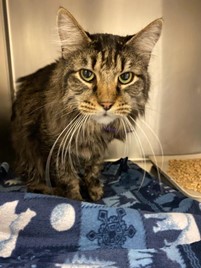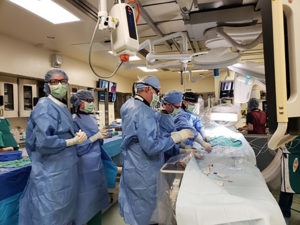
Tummy Trouble in Feline Patients
Chronic diarrhea and vomiting are common clinical signs in the adult feline patient population. In affected cats, it is important for veterinarians to be able to determine the cause of these clinical signs so that they can recommend the most appropriate treatments. This is particularly true for the two most common causes of chronic gastrointestinal (GI) problems: GI lymphoma and Inflammatory Bowel Disease (IBD). Researchers at Colorado State University’s College of Veterinary Medicine and Biomedical Sciences are working together to better understand both diseases and to determine whether a relationship exists between IBD and development of GI lymphoma in cats. Current clinical trials recruiting cats diagnosed with IBD or GI lymphoma are addressing the complexity of these conditions, including identifying risk factors and novel treatments, such as mesenchymal stem cell therapy. In addition to helping lots of cats, results from this study may be directly applicable to human patients suffering from GI diseases such as Crohn’s disease, ulcerative colitis, and other forms of IBD.
Potential benefits of this study:
- Identify techniques to accurately distinguish between GI lymphoma and IBD in feline patients
- Determine whether a relationship exists between GI lymphoma and IBD in cats and whether IBD plays a role in the development of GI lymphoma
- Identify risk factors (genetic and environmental) that contribute to the development of IBD and GI lymphoma in cats
- Explore potential therapeutic treatments for cats with IBD and GI lymphoma
- Strengthen the understanding of IBD in cats as a translational model for similarly affected human patients
“Although stem cells found their way into veterinary medicine through the equine joint, feline inflammatory bowel disease turns out to be another problem where this treatment shows significant promise.”
-Dr. Craig Webb
Investigators:
Craig Webb, DVM, PhD
Tracy Webb, DVM, PhD
Sue VandeWoude, DVM
Anne Avery, VMD, PhD
Research Studies:
http://www.delawarevalleyacademyvm.org/pdfs/may14/EndoDVANotes.pdf
https://files.brief.vet/migration/article/7086/feline-ibd-7086-article.pdf
https://journals.sagepub.com/doi/abs/10.1177/1098612X14561105
https://onlinelibrary.wiley.com/doi/full/10.1111/jsap.12494
https://www.cliniciansbrief.com/article/how-treat-feline-inflammatory-bowel-disease




